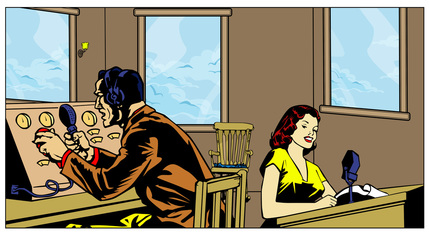|
If you're new to radio presenting, here's a good template to use. Bobby presented his show opening over a one minute music bed. This is why I like it: It tells you who we are Tells you who he is Tells you the name of the show. Tells you what his show is going to do for you. Calls for a request Let's us know that his show has guests, but he doesn't open the mic and start talking to his guests during the opening. I would advise on focusing your opening on you and your show only. He tells us what topics are coming up in his show He mentions the station number again He introduces the first song. All in all, it's very good. ================================================== Opening (50 seconds) Hello and welcome to Whitechapel AM, your award winning radio station here with you for the next hour …. My name's Bobby, and you’re listening to "Music to Make you Smile." We're gonna have a selection of hits that will make you feel relaxed, lift you up and improve your mood. If you've got a request for a special song that means something to you, or you just want hear something that'll put a smile on your face, then call us up on XXXXXX and let us know what you'd like to hear. Also this evening - we’ll have a light-hearted look at the week's news and events, and we'll have some fun conversation from our wonderful guests: Andreas Duncan Joshua and the lovely Melly-Mel Up ahead we've got news and chat about pop star Madonna’s latest charity venture… and we'll find out about Mayor Sadiq Khan’s refurbished hire cycles (previously known as Boris Bikes) So relax and enjoy the show - and don't forget to call us on XXXXX to let us know that special song you want to hear……… But first up - one of my favourite tunes from an absolute legend of music, this is the phenomenal Prince…. Learn where to find show ideas. Discover how to show prep like a pro. Master the mixing desk. What it is, how it works and how to use it. Discover what you shouldn't do as a presenter. Ashley Cowan runs the Online Radio School where he tutors in radio presenting and media interviewing techniques. He was a BBC World Service, Radio studio manager for nine years. He was also the station manager for Radio Kings, the hospital radio station for Kings College Hospital. Other crimes include being the training manager for K2K Radio & Whitechapel AM. As a radio presenter, he's hosted radio shows on three FM stations. That was back in the day when FM radio was a big deal. The poor radio stations that had to put up with his brand of terrible comedy were: Radio DÅB, FLR 107.3 FM, and City FM. Radio DÅB had 100,000 listeners! Woo! When he's not writing about himself in the third person, then he was also a community radio DJ at Radio Kings, TGR Sound, Sydenham Radio, and Croydon Radio. He once did production work for Total Rock.com. That was a fun station with a cool owner and a great broadcast team! Brown fizzy water often accompanied the broadcasts! In his spare time he's London Irish (so he likes a beer) and he also teaches guitar. He's recently created an online "Fingerpicking for Guitar" course. There he teaches the art of fingerpicking for erm...guitar. Students can learn twenty different fingerpicking styles for their chords. Comedy Training Blog 2 Marconi was an Italian and a prolific inventor. He’s widely believed to be the first man to invent the radio. I know this because I can read Wikipedia. In 1894, aged 9, Marconi invented a device that could make a bell ring in another room. It did this by using radio waves. He quickly patented the device and started selling it to his school friends. Soon, legions of students could be seen hiding in bushes outside Italian houses killing themselves laughing. They were having great fun playing radio controlled Knock Down Ginger (Ding Dong Ditch). Sniggering away, they secretly rang doorbells from afar while mustachioed females cried out “Mama mia it's the door-ah bella again!" Bankruptcy soon followed. Back in 1894, radio sets were the size of a garden shed. Hiding behind a bush, sniggering at mustachioed females in calzone shoes, with a twenty-foot radio receiver sticking out of your arse didn’t do your art of camouflage any good. And trying to make a fast getaway from a livid Italian housewife while wearing a shed on your back was no mean feat either. In 1911, aged 26, Marconi moved to London and invented the world’s first ever radio set. He loved listening to radio in bed. His girlfriend, Calamity Whiffletree, on the other hand, hated it. She was always turning over in her sleep and knocking her brains out against the two-foot dials. Marconi fell in love with radio. If he wasn’t bumming one, or french kissing another, then he was always building new sets. By the end of the year, he had sixty-five radio sets in his house. No matter where in the house Calamity went, she was always walking face first into a radio set. She had to sleep standing up due to the bedroom set, cook with her nose to the wall because of the kitchen set, and she even had to do her business with her left leg stuck out of the right bathroom window because of the toilet set. Going for a walk was always problematic. Before she and Marconi could go anywhere, they’d have to hire twelve men, a crane and a horse and carriage so that Marconi could take his portable set with him. Trying to walk hand in hand while Marconi rode on a horse and carriage was very challenging for Calamity. At aged 28, Marconi opened his first radio rental store in New Cross, south London. Soon his radio sets were flying out the window. In fairness, that was mainly due to the local Millwall fans who used to trash his shop after every home defeat. Millwall fans liked his sets. You could do some severe damage to a rival fans testicles with “The Marconi Mauler” twenty-foot radio set. As one Millwall fan said, “The dials on his sets are ideal for stabbing people!” He said this while ramming a Marconi Mauler up a Leeds fan’s left nostril. By 1913, Marconi had rented out over 120,000 radio sets. He was well on his way to becoming a millionaire. Disaster, however, was soon to strike for the second time. Marconi had forgotten a simple fact. No one had actually invented a radio show yet. To stave off a second bankruptcy, Marconi was forced to become the world’s first ever 24/7, 365 days a year, radio DJ. Wherever he was, wherever he went, Marconi had to create a radio show just to stay in business. “Ok, coming up on The Marconi Toilet Hour this..PLOP. And that was PLOP with their first hit single ‘Get the air freshener please and - oh my god I think I’m going to honk.’ Happy Jingle Music The Marconi Toilet Hour is brought to you by Squirty McSquirts constipation relief.” Being the world’s first ever 24/7, 365 days a year, radio presenter drove his poor wife Calamity nuts. “Hi my name’s Marconi, and welcome to the love hour. For the next hour, I’ll be making love to my wife and Ooooooh Myyyyy GoooooOOooood..., thar she bloooows….and we’ll be right back after this short message by THUD...Zzzz.” “Marconi! Is this thing still on?” Over the next four years, Marconi went on to present 15,456 radio shows. His most famous show being “Where’d my foreskin go?” W.M.F.G was a two-hour weekly show aimed at the east end Jewish community from Penge. Guests would come onto the show to ask their parents about their missing foreskins. The show, for some reason, failed to make it in the US. Other shows included “Mapmaking with Midgets”: “Small people need never get lost again” went the jingle. Marconi even broadcast from an abattoir once. “And now he’s going for the leg, and OOOH there goes the leg..and wow there’s so much blood..and OH MY GOD I'm feeling sick, I think I’m going to be the first ever Italian to throw up live on air, and yes here it comes people, I’m now vomiting live on air what looks like diced carrots. But, and get this people, I haven’t eaten any carrots today. THUD..and now I’m face down in my own vomit. It looks like my father was right.” To keep the funds coming in, Marconi started inventing radio adverts: Happy Music “I make £500 an hour by showing my penis on the radio. If you’d like to have a throbbing bank account too, then write to us now at: ‘I’ll get my nob out on air for cash,' Cock Street, Bell End, London SE5 4PZ.” Marconi also made a lot of money with radio pornography. Everything was going throbbingly well until one day the sound effects man got rather drunk. Boris, the Russian cockney sound effects man, got so mangled that he inadvertently destroyed an episode of: “Would You like to Stroke My Microphone?” “Oooh, Aaah, oh Maximilian your receiver is so manly.” Cow mooing sound. “Errr….umm...oh Maximilian, your antenna is too large.” Elephant trumpeting. “FFS! (Deep breath). Maxy, it feels so warm.” Creaky door sound opening. “Nice hooters Mandy!” Sound of someone sneezing. “Ride me like a steamship Horace.” Sound of a horse doing a curry poo. More pressure was put on Marconi when a rival radio station started broadcasting in 1916. talkBOLLOCKS was started by a man called Albrecht Stringybark. Albrecht was to become Marconi’s radio nemesis. Even as a boy, Albrecht was dastardly. He used to have great fun sucking the water out of his goldfish bowl with a straw. Laughing cruelly as his pet fish "Gilbert" flapped around for dear life, Albrecht, as the doctors back then called it, was a complete basket case. As a teenager, he liked using a flick knife to clean out the black bits from between his toes. This toe cleaning, flick knife maneuver, really impressed the local girls. At aged twenty-five and with only one toe left, Albrecht started talkBOLLOCKS. talkBOLLOCKS was a male only radio station, and unlike Marconi, it hired professional radio DJs. Their primary goal was to talk bollocks about things that women thought were bollocks. On February the 12th, 1916, the breakfast show went live. It was hosted by an overweight Scots man called Barclay Buckminster-Fuller-Soloncrank. The first ever talkBOLLOCKS radio topic was: “Don’t drop your chocolate spread and toast onto your white bedspread otherwise, the lassie will think you have diarrhea.” While it proved to be highly controversial at the time, it was a massive rating winner. Marconi hit back in 1917 with his new station talkUNREFRIGATEDFROZENGOODS. While listeners didn’t flock to the station in its early days, “The Horse and Carriage” drive time show proved to be immensely popular. The show had a new feature, “The Eye in the Sky.” It was cutting edge technology back in 1917. Basically, it was a bloke strapped to the top of Nelson’s Column with a candle on his head. His job was to report the local traffic news. “We’ve had a horse decapitation on the Charing Cross High Road. And a carriage has shed its load of horse manure on the Sidcup bypass and... oh my god...... the straps can’t hold me and my twenty-foot radio set anymoooooooooreeeeee...” Audio silence. When Marconi wasn’t involved with the radio, then he was inventing things. Marco loved to invent. He invented the motorised toilet so one could do one’s business while out and about. He also invented the haemorrhoid flosser, and the speaking colostomy bag. Every time you did a number one, it would say, “Aaah I needed that.” Every time you did a number two, it would make a loud flushing sound. It flashed green and red until the bag was emptied. Walking around a Glasgow high street while one’s pants continuously flashed was never going to be a top seller. Marconi sadly died in 1937 while out walking around St Pauls. A traffic reporter fell on his head. After Marconi’s death, his wife Calamity sold all of his radio sets. After thirty years of being crushed by radios, she was finally able to walk around her house. Two weeks later, a hidden set in the loft crashed through the ceiling and flattened her like a pancake. Her last words were: “Marconi you bastarrrrrrr…..” So what can we learn from Marconi’s life? (The boring part) 1. Find a station that’s broadcasting what you want to do. Don’t join a station that isn’t playing your style of music. 2. Sign up, volunteer and practice as much as you can at a local community radio station/a hospital radio station. 3. Study professional radio DJs. Imitate their shows in your early days. 4. Accept the fact that (like this blog) you're going to be terrible at first. However, with constant practice, you will get better. 5. Always prepare your shows. Most beginner radio presenters believe they can talk entertainingly off the top of their heads without scripting. They can’t. At Whitechapel AM, I’ve created an eight-week radio presenter training program. By week two, 90% of the beginner radio DJs realise they need to prep their shows. I love it when they get this point. 6. Listen back and analyse your shows. Ask what worked and what didn’t work. How can you make it better? 7. Practice at home with your show openings and a music bed playing. Read your presenter links aloud at home first. See what sounds good and what sounds bad. 8. In your early days, script everything. As soon as you get better, you can move over to a bullet system of prepping. It means you won't have to script every single link. To develop a great one hour show can take up to three days of work. As soon as you’ve finished one show, you need to start on the next show. It’s like a factory, so you need a system. After you’ve presented your show, take a day off and do nothing. That leaves you six days to prepare for your next show. Six days sounds like a long time, but in reality, it isn't. It typically takes one full day to prep a well thought out, well-researched show. Prepping at the last minute takes a LOT of energy so try and avoid this. I speak from experience. Break your tasks up. Look in your diary and block off sections that you can use to prepare your show. You need to think ahead. If you don't, you'll be out of time, and you'll be stressing out again prepping at the last minute. Start with the fun stuff first. Choose your music. It will help get you rolling. Then make a running order. Put in your music and work out your times. Next, work on your presenter links. If you don't push yourself, you'll become "comfortable" with presenting averagely bland shows. And once you become comfortable, you'll never get past being a hospital/community radio DJ. If however, you consistently pull yourself up with self-critique, your standards will naturally become higher. It will lead you to start making strong radio shows. Once you do that, doors in radio can open up. There are other jobs in radio that hospital/community radio DJs can also do. If you give yourself a comfortable ride, you’ll be a boringly average amateurish radio DJ, etc. If you pull yourself up regularly, demand more from yourself, you will excel. I trained at Radio Kings, the hospital radio station for King's College Hospital from 2000 - 2005. Four of my trainees (including myself), went on to work for the BBC. Therefore, I know that getting a real radio job from community radio, etc. is possible Get as much radio experience as you can. Learn to present, master the mixing desk, create radio packages and learn to interview. My hospital radio experience got me a studio manager job at the BBC. Don’t be an arrogant radio DJ. Listen to your trainer and take on board everything they tell you. Walk away with an attitude of always wanting to learn and always wanting to improve. If you can’t find a trainer, then enroll on one of my courses, and you’ll be able to ask my advice anytime. I’m now practicing comedy writing for fun (hence these rather dodgy blogs). I know I have a long way to go. Therefore, I’m adopting the same strategy I used to break into radio. One, I study. I’ve read some excellent books by John Vorhaus. Next, I practice. I force myself (through these blogs) to consistently write. It’s tough; it’s hard, but by always trying to write I’m hoping to create a system for myself. Now I'll do nothing but practice until I’m happy with my style and skillset. Then I'll step up to the next league and start again. If I continually practice, in five years time, I will be much better than I am now. I’m playing the long game. It took me five years to break into the BBC. But I made it. You can too. If you want to know more, then here’s a straight written blog about breaking into radio. Finally, enjoy it all. Enjoy the struggle, the prep, the mistakes, the learning and the improvement. As long as what you’re doing makes YOU happy, that’s all that matters. This blog was a killer. I struggled. It's not my funniest. However, I laughed, and I enjoyed myself while writing it. And guess what? It all starts again tomorrow! GROAN! :) Keep on rocking! Ashley Learn about where to find show ideas. Discover how to show prep like a pro. Master the mixing desk. What it is, how it works and how to use it. Discover what you shouldn't do as a presenter. Radio King's (King's College Hospital) circa 2001. Check out Cool Edit Pro 2 and that PC! Ashley Cowan runs the Online Radio School where he tutors in radio presenting and media interviewing techniques. He was a BBC World Service, Radio studio manager for nine years. He was also the station manager for Radio Kings, the hospital radio station for Kings College Hospital. Other crimes include being the training manager for K2K Radio & Whitechapel AM. As a radio presenter, he's hosted radio shows on three FM stations. That was back in the day when FM radio was a big deal. The poor radio stations that had to put up with his brand of terrible comedy were: Radio DÅB, FLR 107.3 FM, and City FM. Radio DÅB had 100,000 listeners! Woo! When he's not writing about himself in the third person, then he was also a community radio DJ at Radio Kings, TGR Sound, Sydenham Radio, and Croydon Radio. He once did production work for Total Rock.com. That was a fun station with a cool owner and a great broadcast team! Brown fizzy water often accompanied the broadcasts! In his spare time he's London Irish (so he likes a beer) and he also teaches guitar. He's recently created an online "Fingerpicking for Guitar" course. There he teaches the art of fingerpicking for erm...guitar. Students can learn twenty different fingerpicking styles for their chords. In 2010, I was on holiday in Denmark. I was standing at Aarhus train station waiting for my girlfriend to arrive. Today was the day she was flying in from London to join me for a weeks holiday. It's fair to say I was very excited. When she arrived, my face broke into a massive smile, and I gave her a big hug. Immediately she said, "we've got to talk." She told me she'd made a mistake by dating me and dumped me there and then in the train station. It's fair to say I blubbed like a teenager. After she'd ripped my heart out, she went back to Copenhagen airport to fly home. She had a BBC project she wanted to work on, and I was an inconvenience. I lost 5kg's that week. I couldn't eat. I was totally devastated. The Book of Life The day I was due to fly back to London, my Danish friend and I went to a small charity store in a tiny Danish town. There I found a book called "The Magic of Thinking Big" by David J Schwartz. It was five Danish kroner (50p / 74c). To stop me blubbing on the plane home, I started to read it. There and then I knew I was holding a great book. In 2010, I wasn't ready to act on Mr Schwartz's advice. However, after I'd landed, I made sure I kept the book. When the Student Is Ready the Teacher Will Appear Four years later I re-read it. The chapter on goals really stood out for me. David says: "The person determined to achieve maximum success learns the principle that progress is made one step at a time. A house is built a brick at a time. Football games are won a play at a time. Every big accomplishment is a series of little accomplishments. Winning any objective requires a step-by-step method. Make the next task you perform, regardless of how unimportant it may seem, a step in the right direction." Belief Moves Mountains If you want to get paid to work in radio, the very first thing you have to do is believe you can do it. While this advice sounds like typical fluff, I've actually found it to be very true. A Goal Is a Dream with a Deadline Napoleon Hill (1883-1970) My mission in life is to provide affordable training. When I first had the idea, I needed to buy some software. The software was £150 / $200 to rent for a year. 90% of my friends and family said it was too expensive. They told me to save my money. I almost stopped there, but something inside of me said: "I'm going to build this training site no matter what it takes." I had no idea how I was going to do it, all I knew was that I was going to try. I've always wanted to run a radio training school, but I could never afford the premises, and I could never afford the equipment. I still can't. All Glory Comes from Daring to Begin Les Brown says: "Not only is it possible for you to have your dream, but it's necessary that you go for what is yours in the universe. You do what it is you're supposed to do. If you're supposed to build something, and you don't know how to do it, then learn. It's on you. You've got to make that happen; no one is going to bring it to you on a silver platter. No one is going to say, here's your dream. It's hard, yes it's hard. It's difficult, yes it's difficult, but it's worth it." Go Anywhere as Long as It's Forward David Livingstone (1813-1873) David Schwartz says: "Goals are as essential to success as air is to life. No one ever stumbles into success without a goal. Goals provide energy. Energy increases when you set a desired goal and resolve to work towards that goal. The most amazing thing about a deeply entrenched goal is that it keeps you on course to reach your target." The Driving Force of Goals Because I finally had a "goal", it meant I had something inside of me driving me forward. And my destination? That was simple. To lay the "first brick." As soon as I paid the £150 for the software, I was committed towards my goal of providing cheap, quality, online radio training. I couldn't go back now. I'd paid! I deliberately paid the money on purpose, so I had to go forward. Spending the money was my first brick. What I Must Do Is All That Concerns Me, Not What the People Think Ralph Emerson (1803-1882) I joined Udemy and online instructor Facebook groups. There I watched in amazement as everyone produced training course after training course. By the time I'd written my first script, other people were already publishing their second course. Many members were showing the groups their large payslips of thousands of dollars earned. Meanwhile, I was stuck in a south London bedroom wondering how the hell I was going to build this course. He Who Has Patience May Accomplish Anything (Rabelais 1494-1553) When you start anything new, it's frustrating. It sucks. You have no idea what you're doing, and it takes ages to learn all the new skills that you need. I'm still learning now. My first course, "Discover The Secrets to Successful Media Interviews" took me nine months to make. I made so many mistakes, and I wasted a lot of time trying to build it. I came close to quitting on numerous occasions. There were times when I just wanted to throw the computer at the wall. For months, I had technical problem after technical problem. Whatever could go wrong, did go wrong. A couple of times I even laughed out loud thinking that someone in the universe was deliberately trying to stop me from making the course. I regularly stopped, took weeks off, always thought about quitting; yet I always returned. Don't Dwell on What Went Wrong. Instead, Focus on What to Do Next (Denis Waitley 1933-Present) Two things drove me on (and also drove me insane). I'm old fashioned. I would rather spend ages trying to make a course great, then spend three months rushing out a course that was just average. Why? It's all about having a good product. If your product is good enough, it will sell itself eventually. For me, that's a no-brainer. The second thing that drove me on was the fact that I had come so far. It was now impossible to stop. To spend four months making 50% of a course and then quit would be stupid. Put simply, I grumbled like a bitch, but I had no choice but go forward. It's why you should always just start. Starting builds momentum and momentum carries you forward. The First Brick Is Where You Make The Mistakes My second course, "The Under Priced Awesomely Made Radio DJ Training Course" took me six months to make. I didn't make half as many mistakes the second time around. While I still moaned here and there, I did enjoy making it a lot more! The second time around I was much faster. Why? It's because I'd learned a lot from making my first course. Believe You Can As David Schwartz says: "Belief, strong belief, triggers the mind to figuring ways and means and how to. And believing you can succeed makes others place confidence in you. Those who believe they can move mountains, do. The 'okay-I'll-give-it-a-try-but-I-don't-think-it-will-work' attitude produces failures." It took me a long time to figure this out. Don't Listen To The Doubters Negativity surrounded me for years. I could never see it. It was only when I heard the Les Brown YouTube video "Negative People" that I suddenly became aware of all the negative comments around me. That's when I finally realised how badly these negative comments were holding me back. Tip If you listen to the doubters, you'll be living YOUR life how they want you to live it. Ignore the non-believers. Find Your First Brick If you want to work in radio, find your first brick. This could be writing an email to a college, enquiring about joining a community station, reading a book, phoning a hospital radio station etc. Next, join a community/hospital radio station and get involved with everything. You might start off wanting to be a radio DJ; then you may go and make a radio package. Suddenly, you might love being a community radio reporter. Maybe you'll enjoy working the mixing desk? Might this experience get you to consider being a tech op instead of a radio DJ? Who knows? However, you won't know these things until you try everything. And community radio stations are perfect for this. They'll let you try everything. When you join a community radio station, you'll start learning new skills and experiences. Then you'll meet new people. Meeting new people with the same passion as you will open up more doors. After a while, you'll have a good skill set. Take those new skills and join a bigger station. Learn even more skills and make more contacts. Soon you'll have lots of radio experience. Consider that everything you do is a CV for yourself. Get yourself a portfolio of quality shows or quality radio packages etc. Now you can make a great demo tape. After that, you can start applying for radio presenting/reporting jobs, etc. This is how it works. It's all about experience and having an excellent portfolio of quality work. Give this blog on radio application forms a read. Applying for Jobs in Radio Your first brick will set you in motion. It will start a chain of events. My Radio Chain In 1997, I laid my first brick. I enrolled in Lambeth College, and learned the basics of radio. Afterwards, I joined Radio Kings, a hospital radio station in south London as a volunteer. (Ironically, it was my volunteer work where I learned the most radio skills.) Two years after joining Radio Kings, I became the manager of a radio station with two studios and thirty volunteers. Now I had professional authority. For the next five years, I trained in all aspects of radio. From 1997 to 2002, I put in five application forms to the BBC World Service. When they rejected me, I went away and got more experience. Then I reapplied. In 2002, on my fifth application form (and second interview) I became a studio manager. I stayed at the BBC for nine years. Belief moves mountains. My Current Chain In 2014 I laid the first brick of the Online Radio School. I started working on the script for my "Discover The Secrets To Media Interviewing" course. Then I started making it. It killed me, but the sense of achievement I felt when I finally launched in 2015 was fantastic. I then made a second course. That killed me. Then a station contacted me and said: "Hey your website looks good, can we enroll?" Then two more stations enrolled. Now my website had some credibility. More individual students registered. Then I wrote an ebook called "The Beginner’s Guide To Making Radio Documentaries." I emailed it to a few community stations. One station wrote back and said: "Hey, you should contact Dr. Matthew Linfoot, Course Leader in Radio Production at the University of Westminster. He may have some part time work for you." I emailed the university, he liked my book and said: "Let's hook up for a coffee after the summer break." Then I volunteered at a local hospital radio station in east London. I started training for free. My new station manager recommended my training courses to a larger organisation. Today they emailed me and enquired about my courses. Nothing has happened yet, but just by putting myself into that environment I've suddenly made a new opportunity. If I hadn't volunteered my time for free, my new manager wouldn't have recommended me to this larger organisation. You make your own opportunities in life by simply laying bricks. Brick by brick. This is how it works. Lay your first brick in radio today. Do anything that will move you forward. I still have a long way to go. However, I've also come a long way. If I hadn't laid that first break two years ago, I wouldn't be where I am now. In two more years, I'll be even further down the line. Brick by brick. If you keep going forward, you will arrive at your destination. If You Quit, You Will Never See It Know this. Getting into radio may not happen in the time that you want it to happen. It might take six months, 18 months, 24 months. It took me five years and five application forms. But if you quit, if you give up, if you stop, if you do not persevere, you will never see it. It will never happen. Listen To Motivational Tapes Daily Les Brown says, if you listen to motivational tapes every day it will change the way you think. He's right. I started spending ten to fifteen minutes a day just playing motivational tapes from YouTube. Whenever I was cooking, washing dishes, having a shave, etc. I played Les Brown videos to motivate me. Those videos started to change the way I thought. As Les says: "87% of all self-talk is negative. You've got to make a conscious, deliberate, determined effort to say yes to your dreams. Why not?" Birds Of A Feather Flock Together "If you hang around with losers, you'll end up a loser. Unconsciously you'll pick up their ways. You'll pick up their habits; you'll pick up, most importantly their attitude about life. If you're around cynical, negative people all the time, you will become cynical and negative. " I don't hang around with the same negative people that I used to anymore. It's not because I don't like them, far from it. They're all good people. I just don't hang around with them anymore because a) I don't have anything in common with them now and b) it drains me. Any positive thing I would say was always met with a barrage of negative comments. They were negative not because they wanted me to fail, but simply because they'd bought into the negative way of life. As Les says: "It doesn't take any effort to be a loser. It doesn't take any motivation, any drive, in order to stay down there on a low level. But it calls on everything inside of you to say; I'm going to challenge myself." Maybe it's a British thing. We're quite negative here. I've found it hard to find people who will give you reasons why you can succeed. Most people I know find reasons why you can't succeed. It's why I moved on from my negative friends. Whenever I said I wanted to do X, Y or Z, they'd just tell me the reasons why it couldn't be done. This is why I'm a big Les Brown fan. His words on YouTube are my new positive friends. Recap Believe you can work in radio and you will. Lay that first brick. Join a local station. Volunteer for everything. Present radio shows, make radio packages. Drive the desk. Get yourself a portfolio of quality work and skills. Showcase future employers these assets. Surround yourself with positive people. Their enthusiasm will rub off on you. If you quit, you will never see it. Keep going forward. Enjoy it too. I'm having a blast doing my own thing. As for the ex-girlfriend who dumped me at Aarhus train station and ripped my heart out? I forgave her a week later. I never really spoke to her after that, but internally I forgave her. At the end of the day, I had to accept that she didn't want to be with me. That's life. Forgiving her was easy. It also set me free to work on my dreams! Learn where to find show ideas. Discover how to show prep like a pro. Master the mixing desk. What it is, how it works and how to use it. Discover what you shouldn't do as a presenter. Ashley Cowan runs the Online Radio School where he tutors in radio presenting and media interviewing techniques. He was a BBC World Service, Radio studio manager for nine years. He was also the station manager for Radio Kings, the hospital radio station for Kings College Hospital. Other crimes include being the training manager for K2K Radio & Whitechapel AM. As a radio presenter, he's hosted radio shows on three FM stations. That was back in the day when FM radio was a big deal. The poor radio stations that had to put up with his brand of terrible comedy were: Radio DÅB, FLR 107.3 FM, and City FM. Radio DÅB had 100,000 listeners! Woo! When he's not writing about himself in the third person, then he was also a community radio DJ at Radio Kings, TGR Sound, Sydenham Radio, and Croydon Radio. He once did production work for Total Rock.com. That was a fun station with a cool owner and a great broadcast team! Brown fizzy water often accompanied the broadcasts! In his spare time he's London Irish (so he likes a beer) and he also teaches guitar. He's recently created an online "Fingerpicking for Guitar" course. There he teaches the art of fingerpicking for erm...guitar. Students can learn twenty different fingerpicking styles for their chords. Radio Application Form Tips In 2001, I was putting together my fifth application form to the BBC. In the past four years, I'd been rejected four times, and I couldn’t figure out why. I had lots of experience, but I wasn’t getting shortlisted for any interviews. One of my volunteers, a guy called Peter, had a job helping unemployed people find work. He lent me the book: 'The Complete Idiot's Guide to The Perfect Interview'. Talk about a great book.You can find it here on Amazon. Tip Don’t tell them how good you are. Tell them how good you are for the role. The book taught me to realise that the job description is the key to your application. This point sounds simple, but it’s essential to understand. In all of my previous applications, I was telling employers how experienced I was, but I wasn’t directing that experience specifically to the job role. Remember, don’t tell them how good you are, tell them how good you are for the position. You have to go through the job specification in detail. Anytime it mentions a particular skill, match that skill with real-life experience. Next, provide a concrete example from your life. That's the trick. Tip Always find an example from your past work, which matches the skill the employer wants. Below is a mock version of an application form to be a BBC studio manager. Radio Kings refers to a hospital radio station that I volunteered at, and K2K refers to a community station that I helped. For any job that you apply for, this is the first step you must do. Go through the form and match real experiences to the skills they're after. I apologise for my terrible handwriting! The Problem Solver Think of your application as being a problem solver. The candidate skills they're looking for are problems that the company needs solving. Once you've found the problem (the skill they desire), then find a similar example from real-life. Show them how you solved that problem. And do this for 90% of your answers. Just make sure you find different ways of phrasing how you addressed the issues. Work through the form line by line. Example: 'Experience of successful working in teams with an ability to form effective working relationships quickly, to inspire confidence and to influence others'. 1. Find an example from your real life. We want to create a mini-story for each skill required. If you’re not experienced in radio, then find examples from previous jobs, volunteering, etc. Ask yourself: Was this case typical or had something gone wrong? Did you have to step in and help out? 2. What skills, training, or education did you use to solve the problem? 3. What behaviour traits did you use to fix the problem? 4. What happened at the end of this situation? (Only provide positive answers). 5. What did you learn from the problem? Give a precise answer. Was time saved? Was money made? Was money saved? Were you a team player in this example? Did you have to act alone? Make a Short List for Each Skill They Want Here I'll take an example from my hospital radio experience to address the example question above. Every week I had to perform a ward round with the team. Going on to the wards is scary, and some volunteers didn’t want to do it. I spoke to them, and I showed them I understood their fears. Through dialogue, I built a relationship with them, and I showed them why we did ward rounds and what benefit it gave the patients. I used skills of understanding, reasoning and communication. I got these skills from dealing with patients and staff every week. The result was the volunteers did the ward round and felt brilliant afterwards. I learned to understand colleagues fears and apprehensions, and I learned how to encourage and give confidence. The outcome was we managed to perform a ward round that cheered up the patients. Turn That List into a Written Story (This may be a tad long. Woops!) ( O_o) For five years at Radio Kings, all volunteers had to carry out a ward round once a week. Volunteers had to go up onto the wards and talk to the patients. My job was to collect the volunteers and bring them up to the hospital wards to interact with the patients. Once on the wards, our job was to ask for song requests or to offer a friendly ear to patients in need. Many times patients were afraid and just wanted to talk to us. On some occasions, patients could seem downright hostile to the volunteers. For this reason, many volunteers avoided ward rounds. With volunteers not turning up, the station had to sanction people for non-attendance. Not enough people turning up meant we couldn’t do our job correctly. It was a big issue for the station. My role as the volunteer coordinator was to understand my colleague's fears and to offer them encouragement and confidence. I would always explain to new volunteers in advance that patients could get aggressive; however, under no circumstances should they take it personally. The best way to deflect a patient's aggression was to listen, understand, and empathise with the patient's comment. Once I explained their aggression came from a fear of not being in control, then the volunteers became more understanding. They realised the patients were scared and wanted to offload onto somebody. The result of my interactions with the new volunteers was that nobody avoided ward rounds in the future. Once the new volunteers began to see the effect they were having, station morale went up. Five years of dealing with patients and staff at King's College Hospital gave me skills of understanding, reasoning and communication. Do This for as Many Points as You Can Develop a collection of short stories for the areas that they want. Have at least five examples of the above. Try to get this into your application form as much as you can, but do keep it varied. Introduce these stories in different ways. Remember, you’re a problem solver. Don’t tell them how good you are, tell them how good you are for the role. IMPORTANT : DO NOT OVER EMBELLISH! In other words, don’t make any of it up. On my second BBC application form, I stated I'd set up bands in my hospital radio station. I hadn’t. I'd only miked up a few acoustic singer-songwriters. The BBC interviewers asked me in-depth questions about miking up a band. I couldn’t answer them. They knew I was lying. It was an excellent lesson for me. Push the boundaries; however, make sure that every example you provide can be backed up with real-life 'honest' experience. If you can’t, they will find out! If you don't have enough experience in a particular area, go away and find it. Look at the application form and see where you need to beef up your skills. Next, find a station and get more experience. In the future, it'll help your application forms. Job Interview Advice Let's say you've got an interview. Here's some very quick interview advice that helped me break into the BBC. Know as much as you can about the employer. Understand their needs and problems. What are the needs of the industry? How can you help the company meet these requirements? Educate your employer. Show them how you will assist them. Focus on the company's needs and be their solution to their problems. Showcase an image of stability. They'll want employees who'll stick around. Speak with enthusiasm about the company's mission. Show them how you intend to dedicate yourself to their goals. Have about five stories prepped that will showcase your skills. Don't tell them how great you are, show them you're their solution. Give your answers in a way which demonstrates your interest in them. With all your answers, focus on their needs, their concerns, etc. Give answers which demonstrate how you'll save them time and money. Employers always want to save money and time. Frame your answers to showcase how you'll do this. Learn where to find show ideas. Discover how to show prep like a pro. Master the mixing desk. What it is, how it works and how to use it. Discover what you shouldn't do as a presenter. Ashley Cowan runs the Online Radio School where he tutors in radio presenting and media interviewing techniques. He was a BBC World Service, Radio studio manager for nine years. He was also the station manager for Radio Kings, the hospital radio station for Kings College Hospital. Other crimes include being the training manager for K2K Radio & Whitechapel AM. As a radio presenter, he once hosted radio shows on three FM radio stations. That was back in the day when FM radio was a big deal. The poor radio stations that had to put up with his brand of terrible comedy were: Radio DÅB, FLR 107.3 FM, and City FM. When he's not writing about himself in the third person, then he was also a community radio DJ at Radio Kings, TGR Sound, Sydenham Radio, and Croydon Radio. He once did production work for Total Rock.com. That was a fun station with a cool owner and a great broadcast team! Brown fizzy water often accompanied the broadcasts! Learn To Be A Radio DJ Now! |
Ashley..
is an ex BBC, radio studio manager, and the ex manager of Radio Kings, the hospital radio station for King's College Hospital. He's presented on three FM stations and waaay too many community stations. Archives
May 2020
Categories
All
|
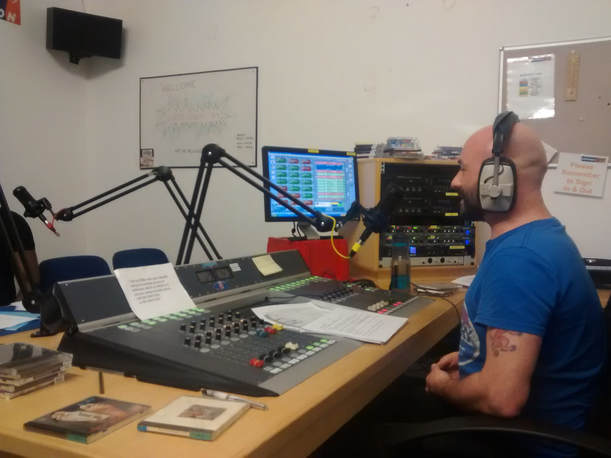

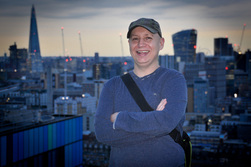
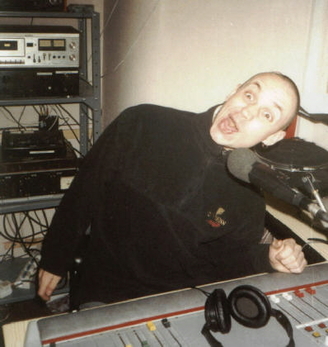
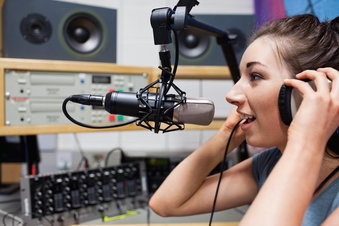
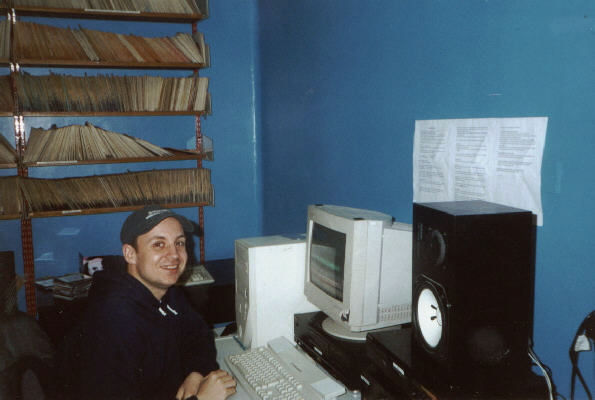
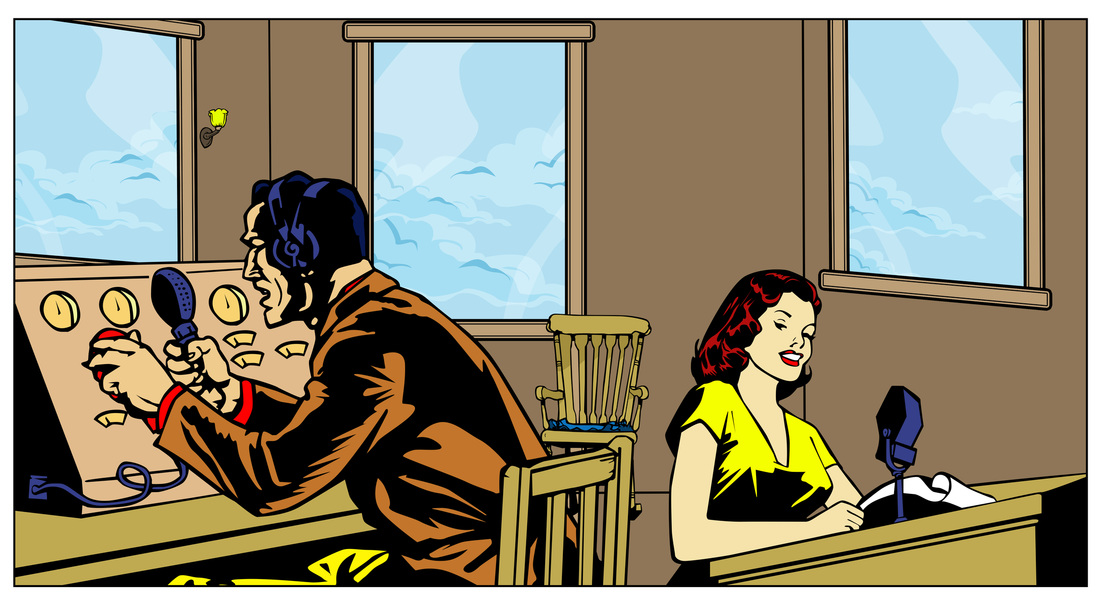
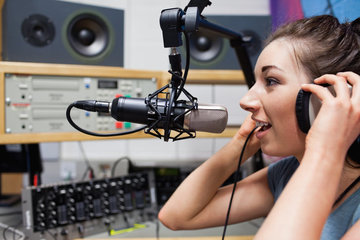

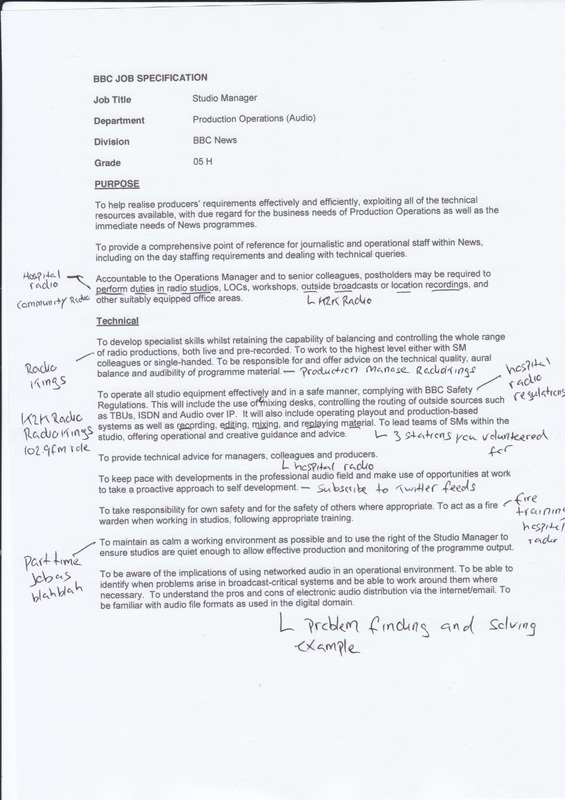
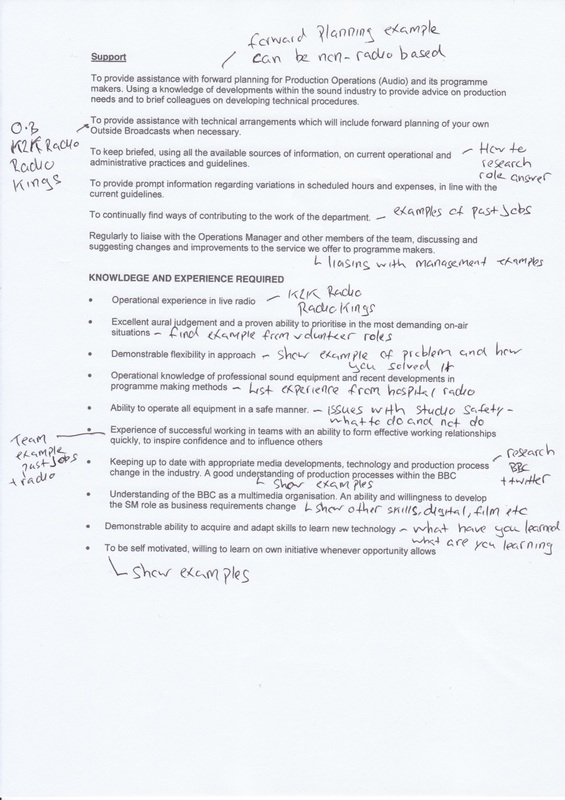
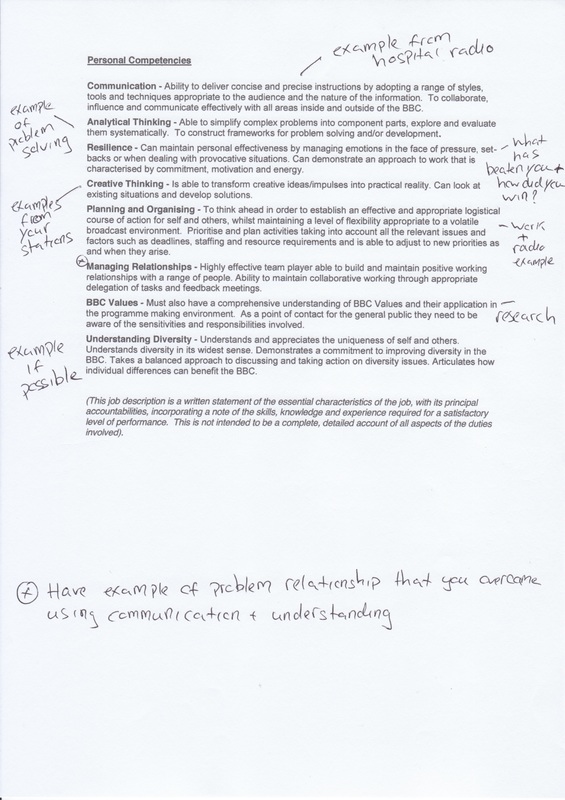
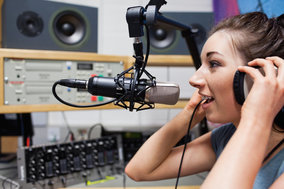
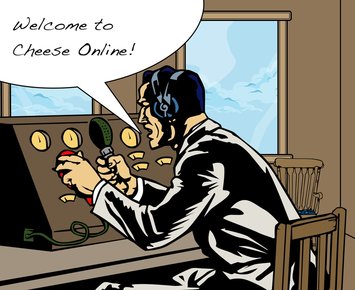
 RSS Feed
RSS Feed
